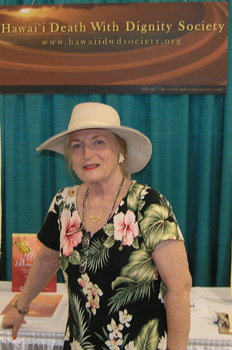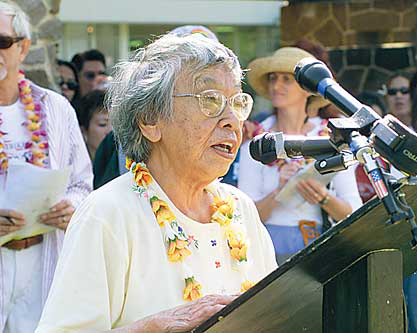This page is dedicated to the memory of our departed members and early advocates. They include: College professor and hospital administrator Ruth Ellen Lindenberg; A.A. “Bud” Smyser, long-time editor of the Honolulu Star-Bulletin; Folly Hofer, a Registered Nurse who gave much of her time and energy to the issue; Hawaii resident and nationally-known writer & advertising executive, Robert “Bob” Rees; Dr. Ira Rohter, University of Hawai`i Professor of Political Science; our founding member Andi Van der Voort; Hawaii State Representative Lisa Naito, and Representative Ernest “Juggie” Heen. All were early and constant advocates for Death With Dignity. Aloha dear friends! We surely miss your guidance and wisdom.
HONOLULU STAR-ADVERTISER
JUL 02, 2013
FORMER DEMOCRATIC LAWMAKER
MADE CIVIL RIGHTS HIS LIFE’S WORK
BY B.J. REYES
 As a state representative and a stalwart pillar of the Democratic Party, Ernest “Juggie” Heen Jr. was a tireless worker for civil rights and workers’ rights, tracing his passion to the 1940s, when as a teenager he accompanied his father, Ernest Sr., to his job as city clerk.
As a state representative and a stalwart pillar of the Democratic Party, Ernest “Juggie” Heen Jr. was a tireless worker for civil rights and workers’ rights, tracing his passion to the 1940s, when as a teenager he accompanied his father, Ernest Sr., to his job as city clerk.
One Saturday, rather than work the half-day that the office was open on weekends, his father closed up and went to Love’s Bakery in Iwilei and filled the back of the family’s four-door sedan with day-old bread. They took the bread to plantation workers on strike in Aiea.
“I remember taking two loaves to a man who was the father of two of my playmates,” Juggie Heen recalled in 2009 as part of an “Aiea Oral History Project.” “I looked up, expecting to see a big broad smile, and I saw this expression of utter embarrassment because he had to accept a handout. I’ll never forget that as long as I live. “Because of this incident, I’m a firm believer in the right to organize as a civil right.”
Heen, among nine siblings from one of the most prominent political families in Hawaii, in his final years became a strong advocate for physician-assisted suicide.
He died Sunday night after a lengthy battle with pancreatic and liver cancer, family and friends said. He was 82. Heen died shortly before midnight at Tripler Army Medical Center for Aging, his older brother, former Circuit and Appeals Court Judge Walter Heen, said Monday. Juggie Heen had entered the center a few months ago. He was diagnosed with lung cancer about 15 years ago and had been in remission when the cancer returned, affecting his liver and pancreas in the last two to three years, his brother said.
“He had some real good times and some real bad times,” Walter Heen said. “We enjoyed a great childhood together, all of the kids.” Gov. Neil Abercrombie, who introduced Heen for a lifetime achievement award from the Democratic Party of Hawaii at last year’s state convention, called Heen a “stalwart champion” of party values.
“He always exhibited strength of character that was complemented by his ability to see through to the core of the issue,” Abercrombie said in a statement. “Our state is left better as a result of his influence and legacy.”
Heen, who got his nickname from a young cousin who had trouble pronouncing “Junior,” served three terms in the state Legislature during the 1960s and in recent years worked as an organizer and mentor for young party members. “I worked with Mr. Heen to learn the intricacies of the party,” said Rep. Justin Woodson (D, Kahului-Wailuku-Puunene), who just completed his first year in the state House. “He would go about introducing me to community members, to prominent party members. He was just always like a coach to me in helping me understand the inner workings of politics here in Hawaii.”
Scott Foster, a family friend and also an advocate for physician-assisted suicide, described Heen as one of the great characters of Hawaii politics. “Just a bigger-than-life gentleman of the old school,” Foster said. “He enthralled me with first-person accounts of historical events that most of us just read as old, stale historical notes. The you-are-there-in-the-room perspective explains some of the nuance of what’s made Hawaii what it is today — good, bad or indifferent.”
Eleanor Mae (Andi) Van der Voort
1935 – 2013

Eleanor “Andi” Van der Voort was the founder and the heart & soul of the Right To Die movement in Hawai`i. She was the driving force behind the original Hawai`i Hemlock Society and later aligned herself with the Final Exit Network and the Euthanasia Research and Guidance Organization (ERGO).
Learning of Andi’s passing, her longtime friend and ally Derek Humphry wrote, “Between organizing meetings, lobbying at the legislature, or sitting at the bedside of dying members, Andi was a nonstop live-wire. You could always count on her. And her hospitality at home was famous.” Humphry founded the original Hemlock Society USA in 1980 and later, ERGO as well as authoring 14 books relating to the right to die.
Andi was a Registered Nurse and had been the Chief Medical Officer on the legendary USS Independence “back in the day.” Andi’s many accomplishments included being a loving wife and mother, a top Honolulu real estate broker, a professional clown, the president of the Hawai`i Hemlock Society, and being a longtime President and Minister with the Hawai`i Humanist Society. Andi was also a Charter Member of our organization, the Hawai`i Death With Dignity Society!
Aloha Andi! Like so many others you somehow encouraged and nurtured, we are standing on your shoulders.
All were saddened by the passing of another of our founding members, Ah Quon “AQ” McElrath in 2008. She would have not abided any grieving and we have provided the media stories here that indeed celebrate her long, admirable life.
December 13, 2008
HONOLULU ADVERTISER
LABOR CHAMPION DIES
Hawaii union, social activist Ah Quon McElrath dies at 92
 Ah Quon McElrath, who helped shape the history of labor and social justice in Hawai’i, died Thursday at Kaiser Moanalua Medical Center. She was 92. McElrath had been ill with cancer and other ailments. Funeral arrangements have not been announced, but the family is planning private services, according to Joanne Kealoha of ILWU Local 142. The union will hold a celebration of life to honor McElrath to coincide with Jack Hall Day in February, she said. McElrath was born in 1915 in Iwilei to Chinese immigrants. After going to work in the pineapple cannery as age 13, McElrath graduated from the University of Hawai’i in 1938 and soon became a key figure with Local 152 of the International Longshore and Warehouse Union. Through the 1950s, the ILWU united sugar and dock workers of different ethnicities in an effort to fight for higher wages and work conditions.
Ah Quon McElrath, who helped shape the history of labor and social justice in Hawai’i, died Thursday at Kaiser Moanalua Medical Center. She was 92. McElrath had been ill with cancer and other ailments. Funeral arrangements have not been announced, but the family is planning private services, according to Joanne Kealoha of ILWU Local 142. The union will hold a celebration of life to honor McElrath to coincide with Jack Hall Day in February, she said. McElrath was born in 1915 in Iwilei to Chinese immigrants. After going to work in the pineapple cannery as age 13, McElrath graduated from the University of Hawai’i in 1938 and soon became a key figure with Local 152 of the International Longshore and Warehouse Union. Through the 1950s, the ILWU united sugar and dock workers of different ethnicities in an effort to fight for higher wages and work conditions.
McElrath took on the job as the union’s social worker, initially as a volunteer. She worked alongside two other ILWU legends, longtime regional director Jack Hall and information director Bob McElrath, whom she married in 1941. They had two children.
McElrath remained an activist for numerous causes throughout her life, prowling the halls of the Legislature to lobby for a wide range of causes including woman’s rights, healthcare and occupational safety concerns, educational opportunities, unemployment and disability insurance, gun control and physician-assisted suicide.
In 1995, McElrath was appointed to the University of Hawaii Board of Regents by Gov. Ben Cayetano and served until 2003.
Among the many awards and honors bestowed on her was the UH Founders Alumni Association Lifetime Achievement Award, for her leadership in advocating social change in education and improving social conditions throughout Hawai’i. She also was named a recipient of the 2004 Hooulu Award for leadership from the Hawaii Institute for Public Affairs.
-###-
NOTE ON THE FOLLOWING: Long-time DwD advocate and founding member of the Hawai`i Death With Dignity Society Ruth Ellen Lindenberg died peacefully and unexpectedly on Friday May 7th, 2004. She had been recuperating from a minor health issue. Ruthellen was a friend, mentor and a feisty advocate for the downtrodden and her sage advice and counsel are greatly missed by the many who knew, worked with and adored her. Her articles on health and human rights issues frequently appeared in local and national publications.
Friday, March 12, 1999
HONOLULU STAR-BULLETIN
VIEWPOINT
Hawaii can’t keep ignoring topic of assisted death
By Ruth Ellen Lindenberg

IT takes a suicide to shake one up. We just had a double suicide in our condo. An elderly couple with serious and irreversible health problems took their lives recently. Admirable people whom I had known and respected for years, they lived on the next floor of my building. The man had been a respected physician, an orthopedist who in his day had put back together countless broken bodies. His civic-minded wife toiled in our election precinct to see that the best candidates were supported. She saw as her duty the need to work for community change. MORE
-###-
NOTE ON THE FOLLOWING: The late A.A. Smyser was a member of Hawai`i Governor Ben Cayetano’s ground-breaking 1997 Blue Ribbon Panel On Living and Dying With Dignity and was a contributing editor to the Honolulu Star-Bulletin. Bud was one of Hawaii’s first Death With Dignity advocates to go public and the issue would never be the same.
November 13, 1997
Honolulu Star-Bulletin
Hawaii’s World
Doctor-Assisted Death With Dignity
By A.A. Smyser

YOU haven’t yet heard of DADD for Doctor-Assisted Death With Dignity. It hasn’t been formed yet. But the editor of Hawaii Medical Journal, Dr. Norman Goldstein, may suggest it as an umbrella name for diverse national organizations advocating exactly that. He believes the DADD acronym could bring the movement recognition and success like that achieved by MADD for Mothers Against Drunk Driving. Goldstein won praise both nationally and locally for devoting the last December and March issues of the Hawaii Medical Journal to doctor-assisted death — probably the only medical journal in America to give it such intense attention. Copies went to medical libraries throughout the U.S. MORE
-###-
NOTE: Death With Dignity Advocate Robert “Bob” Rees lost his battle with cancer in 2005. We miss his powerful voice and his long personal friendship. Read his obit and accolades Here. – sf
January 16, 2005
HONOLULU ADVERTISER
It is my right to die as I choose
By Robert M. Rees
 A metastasized and malignant melanoma was removed from the lymph nodes of my left groin on Dec. 6. When the offending lump was excised, even I, under local anethesia, could offer an accurate diagnosis based on its discoloration from the pigment-producing skin cells — melanocytes — that caused it. The background noise switched abruptly from operating room banter to silence.
A metastasized and malignant melanoma was removed from the lymph nodes of my left groin on Dec. 6. When the offending lump was excised, even I, under local anethesia, could offer an accurate diagnosis based on its discoloration from the pigment-producing skin cells — melanocytes — that caused it. The background noise switched abruptly from operating room banter to silence.
Poet Emily Dickinson, as she so often has, offered up insight:
I heard a fly buzz when I died;
The stillness round my form
Was like the stillness in the air
Between the heaves of storm.
A subsequent CAT scan revealed yet another lump in my right lung. And a biopsy traced it to the same virulent melanoma. All of this, of course, is about as close as you can come to a death sentence without appearing before a Texas judge. I may have anywhere from just a short time to a handful of years.
One of my first ruminations, as odd as it now seems, was on Ernest Becker’s classic Pulitzer Prize-winning book of 1973, “Denial of Death,” a study of the human inclination to spend a lifetime in denial of mortality by obsessing on self-importance. I imagined I was no longer in denial and had beaten Becker at his own game.
Becker turned out to be right. In short order, I developed an interest in the minutia of college football, in reruns of “Cheers” and in plowing through the New York Times “Guide to Essential Knowledge.” I became living proof of what my zoologist friend at Harvard, professor Edward Wilson, wrote in his book “Sociobiology: The New Synthesis”: “The human mind is a device for survival and reproduction, and reason is just one of its various techniques.”
But sooner or later, reality triumphs. The unique ability of humans to visualize the future is a two-edged sword. It was Ernest Hemingway’s protagonist in “A Farewell to Arms,” Catherine Barkley, who presciently said to her lover, “Sometimes I see myself dead in the rain.” When she dies, Lt. Henry leaves the hospital and walks back to the hotel in the rain.
One prepares for the storm. And among other things, depending on the ailment, one might want to have at hand the option of being able to terminate one’s own existence when the only alternative is a semi-comatose fight against intractable pain. The easiest and best way to secure this option would be to ask the physicians who have looked after me for a simple prescription to have on hand for when the alternatives narrow. But in Hawai’i, there is an obstacle to physician-assisted suicide. Thanks to our legislators, it is against state law for a doctor to write such a prescription.
America’s conservatives tend to accept as an article of faith economist Milton Friedman’s treatise called “Free to Choose.” These conservatives are happy to fight for the freedom to make mundane economic choices and yet want to deny anybody with a terminal illness the right to have at hand a medical prescription with which to end one’s own life at the time and place of one’s choosing.
They have forgotten U.S. Supreme Court Justice Robert Jackson’s remarkable words in the midst of World War II when he determined that government may not compel the Pledge of Allegiance. “Freedom to differ,” wrote Jackson, “is not limited to things that do not matter much.”
The U.S. Supreme Court ruled on “Death with Dignity” in 1997 and concluded that due process of the U.S. Constitution does not include a generalized right to commit suicide. However, the court urged the states to reach their own conclusions on the narrower question of whether the terminally ill with intractable pain have a constitutionally based interest in controlling the circumstances of imminent death.
So far, Oregon is the only state to pass a Death with Dignity law. In spite of ongoing but failed attempts by the Bush administration to pre-empt Oregon’s law, it has been in effect for five years and apparently has been well received. In the August 2004 Journal of Clinical Ethics, Oregon’s Health Sciences University reported, “Death with Dignity is a safe, well-regulated option of last resort that improves end-of-life care for everyone.” The report noted that only 25 people per year exercise the option and concluded, “For many patients, simply knowing the option exists creates a climate of comfort.”
Legislation proposed for Hawai’i would do exactly what the court prescribed and what Oregon already does. In 2002, at the urging of Gov. Ben Cayetano and state Sen. Colleen Hanabusa, such a bill nearly passed. After approval on second reading in the state Senate, three senators changed their minds and succumbed to pressure from the Catholic Church, Hawai’i’s Family Forum and others. One of the senators who voted no defended his vote by proffering that the state shouldn’t be involved in a life-and-death issue. This, of course, is a red herring, because by denying the option, the state of Hawai’i already is involved.
The Death with Dignity bill was introduced again last year but was withdrawn by the Democratic House leadership because they thought it lacked the necessary 26 votes. After all, the cynical thinking went, why take a close and controversial vote when a general election is imminent? This year, however, with commanding control of the state House and Senate, there is no excuse for the Democrats not to pass a Death with Dignity bill.
As for me, supported and loved by a marvelous wife, daughter and son — how truly lucky my life has been — I am planning on waging what I hope is a long, existential struggle of epic proportions. I hope to roll back the rock of Sisyphus hurled down by what, after all, is a tiny and random occurrence in the scheme of things.
Robert M. Rees is moderator of ‘Olelo Community Television’s “Counterpoint” and Hawai’i Public Radio’s “Talk of the Islands.” He wrote this article for The Advertiser.
June 22, 2009
HONOLULU ADVERTISER
Ira Rohter, political science professor at UH-Manoa
 “In 1992, Rohter published his book “A Green Hawaii: Sourcebook for Development Alternatives,” which offers a handbook of analysis and solutions for sustainable development advocates and government policymakers in Hawaii and the Pacific islands.
“In 1992, Rohter published his book “A Green Hawaii: Sourcebook for Development Alternatives,” which offers a handbook of analysis and solutions for sustainable development advocates and government policymakers in Hawaii and the Pacific islands.
For many years Rohter was actively involved in public policy issues dealing with social justice, environmentalism, and community economic well-being.” MORE
LISA NAITO
September, 2011
Former H awai`i State Representative Lisa Naito was a unique lady of great character and a knowing twinkle in her eye. Born in Brooklyn, New York, she arrived in Hawai`i after touring the world as a professional big band and jazz vocalist. She was passionate advocate for the rights of others, especially women, and was elected twice to the Hawai`i State Legislature during the mid 1970s when only a handful of women held higher office. Lisa became a caring social worker with the Hawai`i Corrections and Child Protective Service departments. In retirement, she continued to travel the world. Aloha Lisa!
awai`i State Representative Lisa Naito was a unique lady of great character and a knowing twinkle in her eye. Born in Brooklyn, New York, she arrived in Hawai`i after touring the world as a professional big band and jazz vocalist. She was passionate advocate for the rights of others, especially women, and was elected twice to the Hawai`i State Legislature during the mid 1970s when only a handful of women held higher office. Lisa became a caring social worker with the Hawai`i Corrections and Child Protective Service departments. In retirement, she continued to travel the world. Aloha Lisa!
